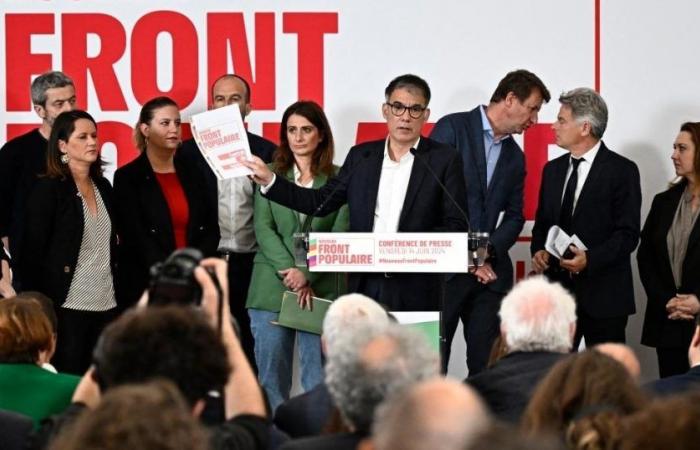
First fifteen days of “breakup”
If they gain power, the parties (including Les Écologues, la France insoumise, the Socialist Party, the French Communist Party, Place publique and Génération·s) united within the New Popular Front (NFP), plan a series of measures strong in the first fifteen days for “respond to emergencies that damage the lives and confidence of the French people”. They notably propose moratoriums on mega-basins, as well as on major motorway infrastructure projects – including the A69 between Toulouse and Castres, until now defended by the Socialist Party and denounced by the rest of the left (our items).
Agriculture
The left intends to present a reform of the Common Agricultural Policy (CAP) of the European Union, expressly reworked in April (our article) to relax numerous environmental measures. The NFP promises to support the organic sector, in difficulty since 2020, to restore the Écophyto plan (which aims to reduce the use of pesticides and was put on hold by the government during the agricultural crisis in February) and to ban glyphosate. The program promotes 100% public water management and proposes moving towards progressive and differential pricing of water resources based on uses. Finally, he undertakes to “break with animal abuse” by leaving factory farms and banning cage farming by the end of the mandate.
Climate
The vote on an energy climate law (to define the French energy strategy in the face of the climate emergency) is planned within the first hundred days in order to “laying the foundations for ecological planning”in parallel with a climate plan to achieve carbon neutrality (i.e. the balance between carbon emitted and carbon absorbed) by 2050. The NFP also endorses the principle of the “green rule”, acclaimed by Jean-Luc Mélenchon for years, which legally establishes that we cannot take more from nature than what it can give.
Energy
The left is committed to supporting the development of renewable energies on a French and European scale, and to making France the European leader in marine energies (with offshore wind). Nothing, however, on nuclear power, the subject of long-standing disagreement between the different formations of the Popular Front – except to return to the merger between the Nuclear Safety Agency (ASN) and the Nuclear Safety Research Institute (IRSN), adopted by the National Assembly in April.
Finance
The New Popular Front intends to vote on an amended finance bill this summer in order to“abolish the privileges of billionaires”. This will notably involve the reestablishment of the wealth solidarity tax (ISF), to which a climate component would be added – a measure which was part of most of the left’s programs during the 2022 presidential election (our article). The program is also committed to putting an end to tax loopholes “inefficient, unfair and polluting” – these are not specified, but we can imagine that the tax exemption on kerosene (our article), long criticized by part of the left, could be one of them. Finally, the NFP intends to regulate banks so that no financing can be granted to fossil fuels (oil, coal and gas) – particularly for the development of new projects.
Transportation
Implementation of a rail and freight plan, launch of regional express services, moratorium on the closure of small lines: the New Popular Front wants to go all out on the train. He also wants to guarantee access to public transport through targeted free measures (for young people, precarious people, etc.) and a reduction in VAT to 5.5% (compared to 10% today) for collective mobility, which would, for example, allow users to avoid price increases linked to increased energy costs.
Biodiversity
The left intends to improve the protection of ecosystems by doubling marine protected areas, by developing a silvicultural (wood) sector “respectful” biodiversity and soils and by defending natural, wet and agricultural areas. It promises to restore the ecological and chemical state of waterways and “make industrialists contribute to the decontamination of water tables and soils”. It is also committed to restoring “thousands of positions eliminated” in various public services, including the National Forestry Office, the French Biodiversity Office, Météo-France and Cerema (the Center for studies and expertise on risks, the environment, mobility and development, which supports public policies in communities).
Overseas
Qualified as“outposts of ecological planning”, the overseas territories are the subject of a certain number of specific proposals, including the creation of a compensation and prevention fund against pollution (victims of chlordecone and glyphosate in the Antilles, nuclear tests in Polynesia, etc.). The NFP promises a pipe renovation plan and a cap on the price of water where the service is failing, while several territories (Mayotte, Guadeloupe, Martinique, etc.) frequently face water cuts (our report at Mayotte).
Diplomacy
A section of the program is dedicated to diplomacy, which has crystallized tensions between the different parties of the union in recent months. In addition to defending a ceasefire in Gaza and supporting Ukraine, several elements directly concern ecology. The program promotes “a diplomacy that preserves our environment” through the recognition of the crime of ecocide, the protection of the seabed and support for the creation of an international tribunal for climate and environmental justice. Finally, it provides for the creation of the status of climate displaced person.
Ambitions to realize on a financial level
Nicolas Dufrêne, director of the Rousseau Institute, a think tank dedicated to ecological transition, recognizes Green a program “serious” and ambitions “consistent with the positions held so far by the different parties in the National Assembly”. Its credibility will then depend on the means put on the table: “On the one hand there are the objectives adopted, but on the other there is also the question of the budget allocated to achieve them. This will require a more precise estimate of the financial needs for the transition, which we do not yet have in the program due to the tight timing.judges the senior official.





